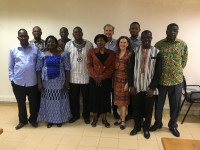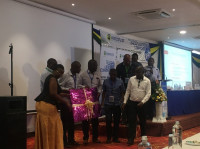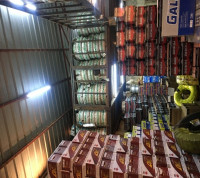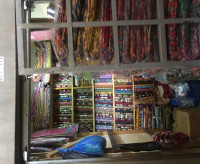Promoting Member Ownership in Credit Unions: How the WOCCU TIFI Project is Making a Difference Among the Underserved in Sub-Saharan Africa
2020-06-02Membership is about ownership in cooperatives. That’s what matters!
The most important capital of any business is its human capital. This is even more validated when it comes to cooperative business enterprises, which are primarily about putting members at the forefront of their “raison d’être,” which adds a layer of importance to the work many of these groups accomplish on a day-to-day basis across the world. Members of cooperatives are able to enjoy a sense of agency, while creating income opportunities for themselves and their families. These are values that World Council of Credit Unions' Technology and Innovation for Financial Inclusion (TIFI) Project is thriving to uphold in three countries—Burkina Faso, Kenya and Guatemala. The main objective of the TIFI project focuses on strengthening credit unions and their national associations (NAs) to increase access to finance for small and medium enterprises (SMEs).
Particularly in Sub-Saharan Africa (SSA), TIFI partners with two major NAs – the Confederation of Financial Institutions (CIF) in West Africa and the Kenyan Union of Savings and Credit Cooperatives (KUSCCO) in Kenya, where over ten million members are part of credit unions (CUs) in those networks. Even though savings and credit transactions are the primary services provided by these financial institutions to their members, the SME market segment is usually underserved, though ironically does provide tremendous income generating opportunities to those same members. Their economic power is obvious; however, their sustainability tends to be at risk if something is not done to ensure they have the necessary tools and resources to grow and expand, and continue to be engines of livelihoods to credit union members who mostly depend on them to survive.
TIFI and its NA partners understand that and aim to tackle this challenge in Burkina Faso and Kenya using a three-pronged approach:
- working closely with NAs and CUs to develop and roll out a toolkit and a set of digital recommendations that can help them better serve their SME members;
- identifying a set of business service providers that can provide support to SME members through their respective credit unions; and
- showcasing the lessons learned from all aspects of our interactions with members and CUs to better inform the global community about the strength and resilience of our local partners.
SMEs and credit unions: the partnership that is key to our members’ livelihoods
From tailor shops in Ouagadougou, Burkina Faso to small grocery stores in the neighborhoods of Machakos in Kenya, members of CUs participate in the development of their respective countries’ social and economic well-being by starting up SMEs in various sectors to improve their lives and livelihoods.
The World Bank estimates SMEs represent about 90% of businesses and make up about 50% of employment worldwide, contributing to an average of 40% of national income of developing and emerging economies[1].
However, as the IFC highlights, 65 million firms or 40% of formal micro, small and medium enterprises (MSMEs) in developing countries have an unmet financial need totaling $5.2 trillion per year[2]. This figure is further exacerbated when we factor in various firms in the informal sector, from which approximately 66% of employment in SSA derive from, according to the International Labour Organization[3]. Based on these critical figures, TIFI sees two main opportunities to effect change:
- reducing the huge gap in access to finance for SMEs through CU liquidity and financial inclusion especially in SSA, and
- mitigating the threat to livelihoods for tens of millions in Burkina and Kenya alone.
To capitalize on these opportunities and put them into practice, TIFI currently operates under a theory of change, which strongly believes that by partnering with CUs that serve millions of members in Burkina Faso and Kenya to diligently identify and pilot specific digital solutions in order to:
- ameliorate their loan application process.
- reduce the time effect linked to loan decision-making.
- manage their liquidity more effectively to close the financial service gap towards SMEs.
Under those conditions, members will improve their livelihoods and increase their social and economic resilience. On the aspect of resilience specifically, now that the world is confronted with the COVID-19 pandemic plaguing every country on earth, members of CUs who are also owners or employees of SMEs have had to drastically make an unforeseen shift from economic well-being to survival mode. At the time of this writing, confirmed cases in Burkina Faso and Kenya were respectively 847, and 1,962[4].
COVID-19: the wrecking ball that redefined social bonding and economic resilience for members of CUs
Oumarou, a Burkina-based owner of an auto parts shop in the suburbs of Ouagadougou with 10-15 employees, stocked his business with goods primarily imported from China. In January, he was still making plans to travel back to China in March to expand his business capacity with a new land he had just acquired, given that business was going really well for him. As a member of a local CU that partners with TIFI, he initially received support from the staff on putting together a business plan that would help him acquire the necessary loan to make his dreams of expanding come true. However, his plans were derailed when the pandemic hit, temporarily shutting down travel, drastically slowing down his business, and forcing people to confine.
Fatoumata is in a similar situation. A member of another partner CU and the owner of a tailor shop in the largest market in Ouagadougou, she imported clothing fabrics from India, China and the Netherlands, which are essential inputs for her business. Fatoumata had plans to expand her business this spring to serve a larger clientele base in Burkina Faso and beyond the borders. Just like Oumarou, COVID-19 had different plans for her.
These two examples are a small sample of the challenges currently faced by our members and SMEs in light of the pandemic. Other Kenyan SME business owners in sectors such as tourism and travel have seen their business totally shut down due to lack of demand—and safety restrictions put in place by the government.
However, TIFI and its partners are relentless, and through several webinars and video conferences from our respective homes, we have been working tirelessly to develop solutions that can help these social groups start to build some financial resilience approaches, while keeping safe and practicing social distancing.
Some examples of solutions we have developed with our partners include:
- improving digital banking platforms to ensure members can conduct financial transactions online.
- restructuring loan repayment for members including SME clients to assuage their financial burden so they can come back stronger.
- sharing accurate and reliable public health messages to members digitally to ensure they can protect themselves and that of their employees, families and fellow members.
CU Members post-COVID-19 – Looking forward to recovery and expansion for members and SMEs
Technology and Innovation; two words that will define the post-COVID-19 era not only for our partner CUs, members and NAs, but for the entire world. The ability to be nimble and adapt will need to be developed in each of us. Particularly for Burkina Faso and Kenya, the emphasis on ownership for CU members will have to be defined more broadly, beyond just the financial and economic stake they have in their cooperatives. Ownership will have to touch on the social capital they have, to form a united front so that instead of building resilience at the individual level only, it can also be done at the community level.
The TIFI project, with its focus on technology and innovation, will continue to promote innovative digital solutions and infrastructures that will provide CUs with solid layers of adaptation to continue building equity for their members, and close the financial gap for SMEs by building an ecosystem for financial tools and resources at their disposal to help them come back stronger and better than they were before.
Herpin R. Jateng, is a program manager for financial inclusion with the TIFI Project, a USAID Cooperative Development Program (CDP)-funded activity.
[1] This information was retrieved from an article on SME Finance on the World Bank website in this link.
[2] This information was retrieved from an article on SME Finance on the World Bank website in this link.
[3] This information was retrieved from an article on Informal economy in African cities on the World Bank website in this link.
[4] This data is as of June 01, 2020 and was retrieved from the Johns Hopkins University of Medicine website.





